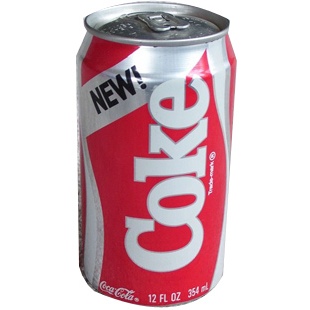While it has yet to be seen whether the city of Calgary can rebrand itself and replace its traditional “Cowtown” image, Global News takes a look at some of the most notorious branding failures ever.
New Coke
One of the most notable failures is Coca Cola’s 1985 introduction of “New Coke.” The brand, promoting a tweak of the flavour of the classic soft drink, was launched with great fanfare after two years of product testing and research.
Public reaction was terrible and the brand was pulled from the shelves after less than three months. The company reintroduced the original formula as “Coca Cola Classic,” and sales rebounded after the New Coke marketing fiasco.
Crystal Pepsi
Seven years later, competitor Pepsi had its own flop in the pop war with the introduction of Crystal Pepsi, a clear version of the original soda. The brand was dismissed by consumers almost as quickly as New Coke, and was subsequently pulled.
Earring Magic Ken
Another classic marketing flop was “Earring Magic Ken,” a 1993 re-invention of Barbie’s clean-cut boyfriend Ken. Toymaker Mattel asked five-year-olds what they wanted Ken to look like, and the result was a bleached-blonde Ken doll with an earring and a purple vest over a mesh t-shirt.
The new Ken was quickly given the moniker “Gay Ken,” since his appearance was similar to the fashion worn by a stereotypical 1990s gay man.
An article about the doll appeared in the gay-oriented newspaper The Stranger, saying the similarities to gay culture could not be coincidental. Mattel discontinued the dolls and recalled as many as it could.
Ayds
While these brands were product failures as much as marketing failures, other brands have failed due to plain bad luck. The chocolate-flavoured diet pill “Ayds” was a huge hit in the 70s and 80s, until the outbreak of the AIDS virus in 1980.
Sales of the pills spiralled, and no amount of rebranding could save the product. Old Ayds commercials have resurfaced online and have become popular for the ironic association with weight loss from the AIDS virus.
Hong Kong tourism
Another unlucky brand flop was a 2003 Hong Kong tourist board ad campaign that ran in magazines and on billboards around the world, with the words “Hong Kong will take your breath away” printed on a picture of fireworks exploding over the city’s skyline.
Shortly after the ads were commissioned, the first cases of the SARS outbreak were being reported, along with symptoms such as shortness of breath.
The tourism board tried to pull the ads, or reprint them with the words “There’s no place like Hong Kong,” but for some publications it was too late and the darkly ironic campaign went ahead.
Toronto Unlimited
Toronto had its own branding failure with the adoption of the “Toronto Unlimited” campaign in 2005. The brand cost millions of dollars to develop, but critics complained that it said nothing about the city, and it appears to have failed to make a significant impact on attracting tourists and new business.
CCRAP
This wasn’t the first Canadian branding blunder. At the founding convention of the newly united Canadian conservative party in 2000, delegates tried to pick a name that would serve as an appealing brand to voters.
The “United Alternative” was rejected as unpalatable. Instead, delegates opted for the apparently pleasing-sounding Canadian Conservative Reform Alliance. With the word “party” added on the end – which detractors had no problem doing — the name had a comical acronym: CCRAP.
Delegates clued in to the joke the next day, and changed the name to the Canadian Reform Conservative Alliance. But the new party’s opponents continued to use the acronym for months afterward.
Hockey Night in Canada
Canadian broadcaster CBC had its own branding flop in 2008 with the loss of its Hockey Night in Canada theme song. Negotiations with the song’s composer, Dolores Claman, were at an impasse in June when the broadcaster threatened to pull the iconic tune.
Hockey fans were incensed, and CBC inboxes were filled with hundreds of complaints about the change. "We’re as attached to the Hockey Night in Canada theme as it seems much of the nation is," CBC head Scott Moore told Canwest News Service at the time.
But despite the attachment, CBC lost the rights and the song was sold to CTV, which promptly added it to the repertoire of TSN, its sports broadcasting cousin.
The CBC held a contest to find a new song and chose the winner from thousands of submissions, in an attempt to appease angry hockey fans missing the familiar theme that had played in their living rooms for 40 years.




Comments